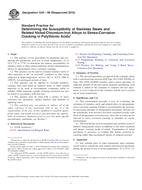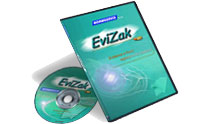Potrebujeme váš súhlas na využitie jednotlivých dát, aby sa vám okrem iného mohli ukazovať informácie týkajúce sa vašich záujmov. Súhlas udelíte kliknutím na tlačidlo „OK“.
ASTM G35-98(2010)
Standard Practice for Determining the Susceptibility of Stainless Steels and Related Nickel-Chromium-Iron Alloys to Stress-Corrosion Cracking in Polythionic Acids
Automaticky preložený názov:
Štandardné praktiky pre stanovenie náchylnosť nerezovej ocele a súvisiacich nikel-chróm-zliatin železa, aby sa stresom koróznemu praskanie v Polythionic kyselín
NORMA vydaná dňa 1.9.2010
Informácie o norme:
Označenie normy: ASTM G35-98(2010)
Poznámka: NEPLATNÁ
Dátum vydania normy: 1.9.2010
Kód tovaru: NS-57654
Počet strán: 3
Približná hmotnosť: 9 g (0.02 libier)
Krajina: Americká technická norma
Kategória: Technické normy ASTM
Anotácia textu normy ASTM G35-98(2010) :
Keywords:
accelerated test, nickel-chromium-iron alloys, polythionic acids, stainless steels, stress-corrosion cracking,: Accelerated aging/testing--corrosion, Castings, Continuous immersion, Copper-ammonium sulfate solution, Corrosion--stress-corrosion, Nickel-chromium-iron alloys, Nonferrous metals/alloys, Polythionic acid test, Stainless steel (corrosion testing), Steel castings, Stress corrosion cracking (SCC), Sulfide/sulfur environments, Sulfur--steel, Welding/welds
Doplňujúce informácie
| Significance and Use | ||||||||
|
This environment provides a way of evaluating the resistance of stainless steels and related alloys to intergranular stress corrosion cracking. Failure is accelerated by the presence of increasing amounts of intergranular precipitate. Results for the polythionic acid test have not been correlated exactly with those of intergranular corrosion tests. Also, this test may not be relevant to stress corrosion cracking in chlorides or caustic environments. The polythionic acid environment may produce areas of shallow intergranular attack in addition to the more localized and deeper cracking mode of attack. Examination of failed specimens is necessary to confirm that failure occurred by cracking rather than mechanical failure of reduced sections. |
||||||||
| 1. Scope | ||||||||
|
1.1 This practice covers procedures for preparing and conducting the polythionic acid test at room temperature, 22 to 25°C (72 to 77°F), to determine the relative susceptibility of stainless steels or other related materials (nickel-chromiumiron alloys) to intergranular stress corrosion cracking. 1.2 This practice can be used to evaluate stainless steels or other materials in the “as received” condition or after being subjected to high-temperature service, 482 to 815°C (900 to 1500°F), for prolonged periods of time. 1.3 This practice can be applied to wrought products, castings, and weld metal of stainless steels or other related materials to be used in environments containing sulfur or sulfides. Other materials capable of being sensitized can also be tested in accordance with this test. 1.4 This practice may be used with a variety of stress corrosion test specimens, surface finishes, and methods of applying stress. 1.5 This standard does not purport to address all of the safety concerns, if any, associated with its use. It is the responsibility of the user of this standard to establish appropriate safety and health practices and determine the applicability of regulatory limitations prior to use. For more specific precautionary statements, see Section 7. |
||||||||
| 2. Referenced Documents | ||||||||
|
Odporúčame:
EviZak - všetky zákony vrátane ich evidencie na jednom mieste
Poskytovanie aktuálnych informácií o legislatívnych predpisoch vyhlásených v Zbierke zákonov od roku 1945.
Aktualizácia 2x v mesiaci !
Chcete vedieť viac informácii ? Pozrite sa na túto stránku.




 Cookies
Cookies
